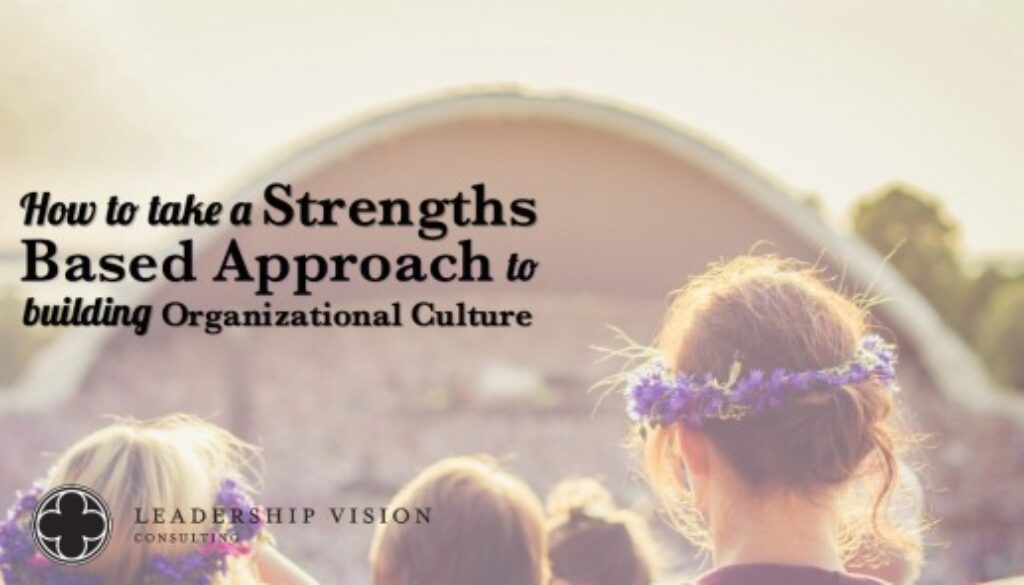How to take a Strengths Based Approach to Building Organizational Culture
Culture is important. Be that in a family, business, or informal organization (like a 4H club or book club). It leads to greater clarity of purpose and value. Without it, team members can quickly become disengaged or worse. But where does it begin?
Noted leadership gurus, Lee Bolman and Terrance Deal assert that,
Culture forms the superglue that bonds an organization together, unites people, and helps an enterprise accomplish desired ends.
LVC believes that working with strong people and teams ultimately leads to a strong culture. A strong culture is one that creates an environment of “Empowering a Sustainable Strengths Environment.”
But what is culture?
Defining Culture
Interestingly, the number one word on the 2014 Merriam Webster’s “Words of the Year” list was culture.
Merriam Webster stated,
The word culture has moved from the classroom syllabus to the conversation at large, appearing in headlines and analyses across a wide swath of topics.
The word “culture” pops up everywhere describing specific groups like the Parisian culture or a specific country’s culture, or more broadly as a culture of quality or openness within a business. Studying cultures is more accessible in a global age where tourists, on-lookers or outsiders can experience an unknown culture by a simple Google search.
Through study and observation, we notice cultural gaps between generations or gender, and similarities or differences in companies or families. We can ask questions like: What do people value? How do those values affect behavior? What unifies people to accomplish certain ends?
The answers to those questions begin to reveal culture.
Culture as a Buzzword
Building organizational culture is important, yet I think it is fair to say “culture” has become a buzzword. The water around buzzwords tends to get murky. Buzzwords can sometimes feel loaded or laden with baggage. Sometimes overuse of buzzwords confine the definition or attach misappropriated meaning from over-inflated to completely dumbed-down.
Think, “community” or “leadership.” It seems that “culture” has entered in those muddy waters. Thankfully, LVC is in the business of building strong people on strong teams in strong cultures. We can leverage the buzzword to offer a definition of substance.
Why Culture Matters
We spend a lot of time at work. We can all name environments where there has been great fit culturally, and we can all name environments where the life seemed sucked out of you.
Think about the environments or cultures that align with your strengths. Perhaps the culture is thriving and you experience it. You feel alive. You feel energized to get to work and are proud of the work you do.
When I think about the great teams I’ve been a part of, I reflect on the high levels of trust and respect. On those great teams, it wasn’t about who was best, but how we worked together to accomplish excellence at an exponential level.
People were valued.
People were recognized.
We were unified putting our arms around great causes outside of ourselves. There was laughter, big and hearty laughter. At the same time, there was seriousness and diligence. It wasn’t perfect, but once you’ve tasted a great culture, your palate is ruined for anything less than brilliance.
There are also the cultures I never want to be a part of again. You can probably name those environments as well. For me, I don’t thrive in an environment where micromanaging reigns supreme. A bean counter mentality sucks the life out of me.
The cultures I’m thinking about weren’t necessarily bad; in fact, there were some amazing people in them. However, those cultures just didn’t jive with who I am, what I value, or how my strengths are best leveraged. Those cultures ate strategy for breakfast, and I felt that my good intentions got swept away by the waves of a culture of apathy.
We Become What We Tolerate
I once read that a culture becomes what it tolerates. This can be positive or negative. For me, I want to be part of cultures that expect excellence and hard work towards similar goals. Where low-level living is not tolerated. Where accountability pushes everyone to greatness. I want to contribute to a positive culture by rewarding teamwork, recognizing strengths, and highlighting the best in others. I value a cultural fit where people are lifelong learners, joyful and generous, and relational no matter what the goal.
Building Organizational Culture: LVC and Aeritae
LVC has had the privilege of working with the people and teams at Aeritae Consulting Group over the last several years. During that time, there has been an intentional focus on the overall culture of the company.
In addition to my work with LVC, I serve on the executive leadership team at Aeritae Consulting Group as the Director of Strengths Based Organizational Culture. Aeritae is a technology consulting company that addresses complex IT challenges and creates actionable plans for key results.
In the sea of change working with a plethora of people, technology, and environments, Aeritae provides solutions that ultimately take culture into account. Aeritae is a strengths based company who seeks to leverage the strengths of individuals within teams that ultimately best serve the clients with whom we work.
Here are three ways Aeritae successfully does this.
Step 1.
Aeritae attracts top talent by demonstrating values and imagining how each person who joins the company shapes the contours of the culture. Aeritae does not use Strengths as a way to hire or place people, but rather as a way to better understand what each individual can contribute to the culture.
Step 2.
When it comes to teaming and delivery, Aeritae takes a descriptive approach. They find the best, most talented individuals (Strong People) and then they build highly effective groups (Strong Teams). Using strengths, Aeritae employees can understand how different sets of strengths will compliment one another. Perhaps more importantly, strengths provide understanding, and there is high value placed on unique voices and different perspectives.
Step 3.
Aeritae invites team members to contribute their wisdom, their voice, to help shape the culture. (Strong Culture). Throughout the whole process, strengths are a construct to better understand the motivation, actions, emotions, thought processes, decisions, ideas, and contributions of others. By inviting Aeritae team members to be part of growing a positive culture that leverages their unique set of strengths, there has been deeper understanding and increased engagement across the company.
Your Organizational Culture
What is the culture like in your organization? How have you used strengths to impact it? What would it take to become a culture that is more focused on strength?





